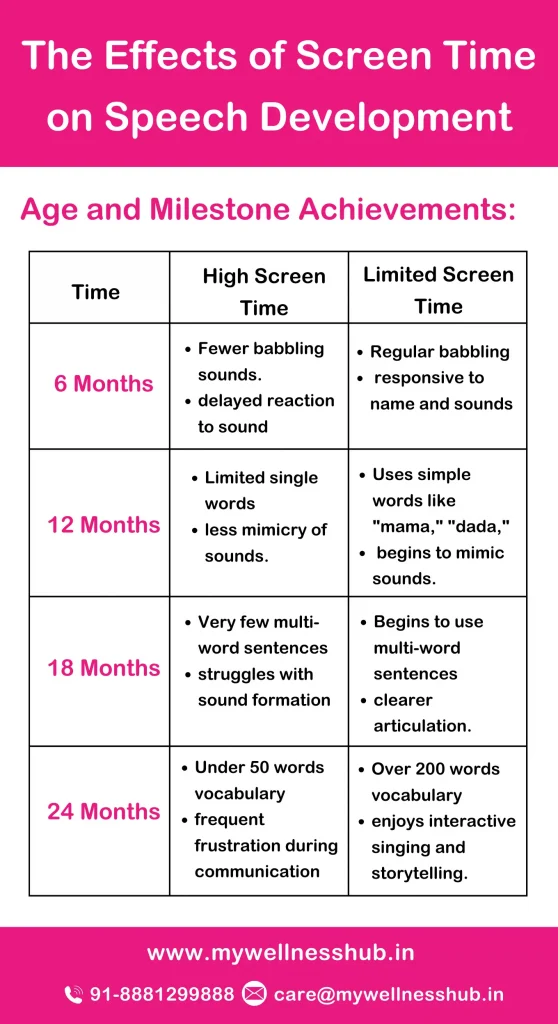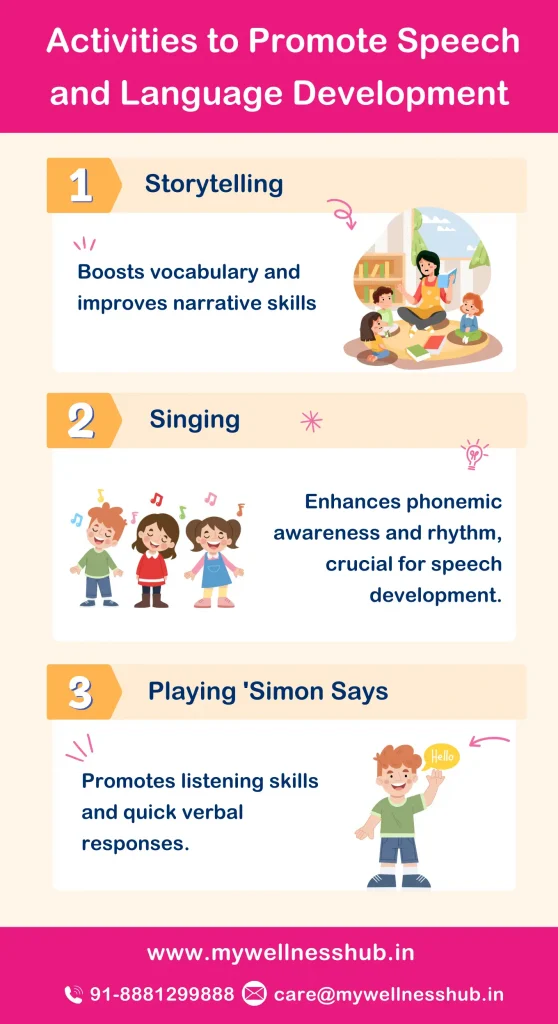Does Screen Time Impact Articulation Skills in Kids?
By Rajini D
Last Updated: December 27, 2024
As digital devices become ubiquitous in our lives, concerns are rising about their impact on children’s developmental milestones, particularly articulation skills. This article examines how screen time affects the way children learn to articulate, providing insights and guidance for parents seeking to balance technology with healthy development. Join us as we explore effective strategies to ensure that screen time supports rather than hinders your child’s speech progress.
Understanding Articulation Skills in Children
What Are Articulation Skills?
Articulation skills are crucial to a child’s ability to communicate effectively. These skills involve the clarity and precision with which a child forms sounds and words. From the first babble to full sentences, each sound a child makes is a stepping stone in their journey to clear speech. Good articulation means being understood by others, which is essential not just for communication but also for building confidence and social skills during early childhood development.
Also Read: Why is Articulation Important for Your Child’s Speech Development
Key Milestones in Speech and Language Development
Speech and language development follows a predictable pattern in young children. Here’s a simplified overview of the key milestones you might expect as your child grows:
- Birth to 6 Months: Babies start by cooing and making pleasure sounds. They respond to their name and begin to differentiate emotions through tone of voice.
- 6 to 12 Months: Babbling begins, with sounds like “ba-ba” or “da-da.” Infants start to imitate different speech sounds and may say their first words.
- 1 to 2 Years: Children begin using words more frequently and start to string two words together, such as “more cookie” or “go park.”
- 2 to 3 Years: Vocabulary bursts to about 200 words, and kids begin forming simple sentences. They start asking questions and can be understood by family or close acquaintances.
- 3 to 5 Years: Sentences become more complex, and vocabulary continues to expand. Children begin to master the rules of language, such as tense and plurals.
Read more: Speech Development Milestones: Your Child’s Talking Journey
The Role of Screen Time in Child Development
What is Considered Screen Time?
Screen time refers to the amount of time spent using devices with screens such as smartphones, tablets, computers, and televisions. It includes both the passive act of watching TV and the interactive use of tablets and smartphones, whether for watching videos, playing games, or using apps. The digital landscape today means children are exposed to these devices from a very young age, making it crucial to understand the implications and manage their usage effectively.

Current Recommendations for Screen Time in Kids
Pediatric experts have set guidelines to help parents navigate the complex world of digital media and its impact on children. Here’s a simplified overview based on age:
- Under 18 months: Avoid use of screen media other than video chatting. Babies and toddlers need hands-on exploration and social interaction to help develop cognitive, language, motor, and social-emotional skills.
- 18 months to 2 years: If introducing digital media, choose high-quality programming and watch it with your children to help them understand what they’re seeing.
- 2 to 5 years: Limit screen time to one hour per day of high-quality programs. Parents should co-view media with children to ensure understanding and apply what they learn to the world around them.
- 6 years and older: Consistent limits on the time spent using media, and the types of media, ensure media does not take the place of adequate sleep, physical activity, and other behaviors essential to health.
Screen Time Guidelines by Age
| Age Group | Recommended Screen Time | Notes |
|---|---|---|
| Under 18 months | None, except video chatting | Critical period for sensory and motor development |
| 18 months – 2 years | Watch high-quality programs together | Start slowly with educational content |
| 2 years – 5 years | 1 hour per day | Choose interactive and educational content |
| 6 years and older | Set consistent limits | Ensure screen time does not replace physical activity, sleep, or real-life interactions |
Investigating the Impact of Screen Time on Articulation
How Screen Time Might Affect Speech Development
Too much screen time can impact how well children learn to talk. When kids spend more time with screens and less time talking to others, they might not practice speaking as much. This lack of practice can slow down their ability to clearly say words. Plus, watching or listening to a screen doesn’t require responding, so kids might not get enough practice speaking up and expressing themselves.

Research Findings on Screen Time and Speech Delays
Research shows that kids who watch screens for more than two hours a day are more likely to have trouble speaking clearly. One study found that each extra 30 minutes of screen time could increase the risk of speech delays in young children. Experts like those at the American Academy of Pediatrics recommend balancing screen time with activities that involve talking and interacting with others. At Wellness Hub, we suggest mixing screen time with plenty of talking and playing to help children develop good speaking skills.
Balancing Screen Time for Healthy Articulation
Tips for Managing Screen Time Effectively
Managing your child’s screen time doesn’t mean eliminating it entirely—rather, it’s about finding a healthy balance that benefits their development. Here are some practical tips for parents:
- Set Clear Limits: Establish daily or weekly screen time limits to ensure your child engages in a variety of activities. For toddlers and preschoolers, aim for no more than one hour per day; older children should have consistent limits tailored to their age and needs.
- Be a Role Model: Children mimic adult behaviors, so demonstrate balanced screen use yourself. Prioritize face-to-face interactions within the family to encourage the same in your children.
- Create Screen-free Zones: Designate areas like bedrooms and dining rooms as screen-free zones to promote interaction and ensure screens don’t interfere with sleep.
- Choose Quality Content: When screen time is allowed, opt for high-quality educational content that is interactive rather than passive. Engage with your child during screen use to make it more interactive and beneficial.

Engaging Alternatives to Screen Time
To promote speech and language development, involve your child in activities that require interaction and communication. Here are some engaging alternatives to screen time:
- Storytelling and Reading: Spend time reading books with your child, asking questions about the story and characters to encourage articulation and vocabulary development.
- Interactive Games: Play games that involve singing, rhyming, and repetition. Games like ‘Simon Says’ or ‘I Spy’ are great for practicing listening and speaking skills.
- Arts and Crafts: Activities that involve following verbal instructions can enhance your child’s ability to process and articulate language.
- Outdoor Play: Encourage outdoor play with other children, which naturally involves communication, negotiation, and storytelling.
- Routine Conversations: Incorporate more dialogue into daily routines, like discussing the day’s events or planning family activities together.
Conclusion
Balancing screen time is key to helping your child’s speech develop well. Remember, real conversations and playtime are crucial for their ability to speak clearly. Set screen time limits and choose interactive content to give your child a good mix of activities. If you notice your child struggling with words, don’t hesitate to get help from speech experts. Visit Wellness Hub for more tips on managing screen time and boosting your child’s communication skills. Together, we can ensure our kids grow up expressive and confident.
Frequently Asked Questions:
1. What is considered too much screen time for kids?
Pediatricians recommend limiting screen time to one hour per day for children aged 2 to 5 years. For older children and teenagers, the focus should be on the quality of content and ensuring that screen use does not replace needed physical activity, sleep, and interpersonal interactions.
2. Can screen time affect a child’s ability to speak?
Yes, excessive screen time can reduce the amount of interactive verbal communication a child engages in, which is crucial for developing proper speech and language skills. This can lead to delays in speech development and articulation issues.
3. What are the signs of articulation problems in kids?
Signs of articulation issues include unclear speech that is not improving, omitting sounds, substituting one sound for another, excessive jumbling of words, or visible frustration when trying to communicate.
4. How can I reduce my child’s screen time effectively?
Set specific limits on screen use, create screen-free zones at home, and ensure that screen time is a part of a balanced daily schedule that includes plenty of physical activity and face-to-face interaction.
5. What activities can help improve my child’s speech development?
Engage your child in storytelling, reading aloud, singing, and interactive play that encourages verbal responses. These activities enhance vocabulary and help practice articulation in a fun, low-pressure way.
6. When should I seek professional help for my child’s speech issues?
Consider consulting a speech therapist if your child is not meeting speech development milestones, shows consistent trouble with articulating words, or if their speech issues interfere with communication and daily functioning.
7. How does interacting with my child help their speech development?
Direct interaction and communication with your child are crucial for speech development. Engaging in conversations, asking questions, and encouraging your child to express themselves verbally support their articulation skills and language development.
8. What types of screen content are best for children’s language development?
Choose high-quality, educational content that is interactive rather than passive. Programs that encourage viewers to respond verbally, ask questions, or solve problems can be beneficial for developing speech and language skills.
9. Can screen time before bed affect my child’s speech?
Using screens before bed can interfere with sleep quality, which is important for cognitive and language development. It’s best to avoid screens at least one hour before bedtime to ensure your child gets adequate rest.
10. Where can I find resources to help with my child’s speech development?
Wellness Hub offers a variety of tools and resources designed to support children’s speech and language development. Visit our website to explore articles, programs, and activities that can assist you in enhancing your child’s communication skills.
About the Author:
Rajini Darugupally
M.Sc., Speech-Language Pathologist (9+ years of experience)
Rajini is a passionate and dedicated Speech-Language Pathologist with over 9+ years of experience, specializing in both developmental speech and language disorders in children and rehabilitation in adults. Currently, at Wellness Hub, she thrives in a team environment that values innovation, compassion, and achieving results for their clients.
Book your Free Consultation Today
Parent/Caregiver Info:
Client’s Details:
* Error Message









